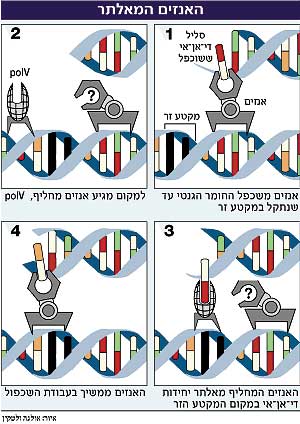Research findings by Weizmann Institute scientists give rise to hope that the human body can find within itself the necessary forces to overcome serious malfunctions in which foreign substances penetrate the genetic load

Every day billions of cells divide in our body. This is how new and fresh cells are created to take the place of cells that have worn out and reached the end of their life course. In the process of cell division, their genetic material, DNA, is copied into the newly formed cells. This copying process is carried out by polymerase-type enzymes, which are, in fact, a kind of sophisticated replication machines specially adapted to DNA replication. Weizmann Institute scientists recently discovered that the polymerase enzymes are able to solve problems and difficulties in the copying process, by way of improvisation. These findings - published in the scientific journal
Proceedings of the National Academy of Sciences (PNAS), may help in understanding diseases resulting from problems in DNA copying, including certain types of cancer.
The polymerase enzymes that replicate DNA "ride" on the strands of the DNA molecule and "travel" along it, when they "read" the genetic information and create identical genetic strands according to it. In this way, the continuity of the existence of our genetic load, which passes from generation to generation, is preserved. The problems begin when the DNA is damaged (for example due to factors such as smoking, radiation, or incorrect processes occurring in the body). Although, in our bodies there are special enzymes that repair the damage caused to the DNA, but some of the defects escape the repair enzymes so that the polymerase enzymes that replicate the DNA have to deal with them in real time, during the replication of the genetic material in the process of cell division. Prof. Zvi Livna, The head of the Department of Biological Chemistry at the Weizmann Institute of Science, who worked with research student Ayelet Maor-Shoshani, examined with his research group the extent of the ability of the DNA replicating polymerase enzymes to deal with damage caused to the genetic material. The scientists cut a strand of DNA (in the E. coli bacterium) and incorporated a completely foreign substance into it, similar to one of the components of oil. At this stage they followed a DNA polymerase enzyme that began to replicate the defective genetic segment. When it reached the foreign material, the replicating enzyme stopped, as expected, but at this point the scientists were surprised to find that a different type of DNA replicating polymerase enzyme suddenly appeared instead and came to the aid of the stuck enzyme, and continued the copying process. In fact, the surprise grew even more when it became clear that the enzyme "fills the place" does not copy genetic information, but creates new information by way of improvisation: in front of the section that contains foreign material, which does not contain any genetic information, the enzyme chooses to place genetic "letters" randomly. In a way, the enzyme acts similar to a person who forgets some words in a song and invents, in real time, new words so that he can continue singing.
In other cases, the polymerase enzymes that replicate the DNA are found to skip over the foreign material or cut it out so that they can continue their journey of replication. "These findings show the amazing ability of the cell to overcome malfunctions and divide in a process that is essential for the continuity of life," says Prof. Livna. "At the same time, they also inspire hope that the human body can find within itself the necessary forces to overcome serious malfunctions in which foreign substances penetrate into our genetic load." This improvisational process of the DNA replicating polymerase enzymes may, of course, create mutations in the new cells.
"But", explains Prof. Livna, "in many cases the body prefers to receive a cell containing a certain mutation, which may operate with a reasonable degree of efficiency." An overly meticulous approach could lead to the death of too many cells, which the body certainly cannot afford." A certain compromise, it turns out, is an essential quality for the continuation of life not only in the big world, but also in the microscopic world of molecules and cells.
The name of the article
"Lesion bypass DNA polymerases replicate across non-DNA segments" PNAS December 9, 2003
